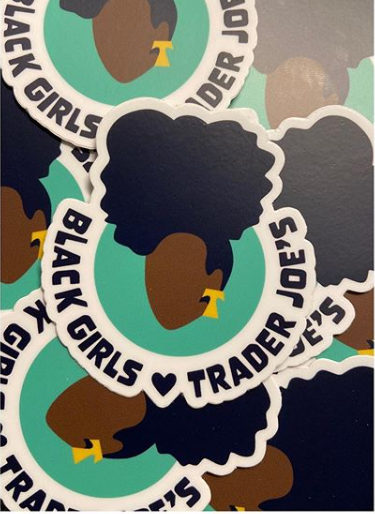Black Girls Love Trader Joe’s Lends an Ear to Black Sisterhood, Social Justice and Love of Groceries
The act and art of grocery shopping can be lauded as a mission, a chore or an exciting challenge. COVID-19 has shifted the definition of grocery shopping from being a simple weekly task to one of the only things you can do amid nationwide business closures, and it turned into the literal Hunger Games.
But amid a global pandemic and racially charged civil unrest, Black Girls Love Trader Joe’s Instagram account is curating a space for Black women to find solace in creativity, cooking, discovering new foods and forging sisterhood in a predominately White space.
In a very vibrant interview via FaceTime, the 3 Black women creators of the account-Shae, Taylor and Latifah laughed with me while explaining the importance of Black women being unified, food insecurity, the social justice impact the account has and more.
The first post was an introductory one made on May 24th and the account has since then gained 12.4k followers. Sporting a white logo with a cartoon head of a Black woman with a gold T earring in black and teal green, the page has caused quite a splash in the Trader Joe’s online community.
““I saw other Trader Joe’s fan accounts, but I didn’t see one specifically for Black women-and they didn’t look like us,” said Shae. “I knew I wanted a digital space that was for us, by us and I had to do it with my friends.”
So with meticulous planning, tons of emails and FaceTime sessions and deep seated creativity, Black Girls Love Trader Joe’s was born.
A labor of love, planning and obsession with other Black and Brown women over Trader Joe’s trendy food and home goods products, BGLTJ posts quality content like hauls, photos and interactive photos, Trader Joe’s surprise boxes Black women send to each other and more, including Black Lives Matter content, which all three women are very precarious and staunch about.
In terms of social justice, not only is the Black Girls Love Trader Joe’s account vocal on civil/racial unrest, but so are each of the three creators in their own unique way- Shae is an aviation professional and advocate for Black professionals in the workplace, Latifah is actually a chef (IG GCcateringco) who believes in food accessibility and new flavors-foods, and Taylor (IG MamaMangos) is a non-profit professional and postpartum doula who brings herbal medicine, access to childcare and Black birthworkers to the forefront. Each of their unique lanes of justice play a significant role in the curation of the account and specifically amplify the overarching message on food security and exploration in typically gentrified spaces. Their personalities melding together at several intersections is what sets them apart from any other Trader Joe’s social media accounts, and everyone agrees.
“The art of food is advocacy and social justice within itself,” said Taylor. “There has to be a specific degree of intentionality and we discovered that we can be intentional by creating an inclusive space for Black and Brown women. Trader Joe’s is a very fun, welcoming, joyous place to be, so we wanted to display that positivity in a space that’s celebrates us.”
These words have never rang truer. With the state of politics and a racial/civil reckoning, the importance of intentionally curated spaces for people of color who are usually overlooked but who are the biggest consumers of material goods is vital.
Food in and of itself is political-from who has access to slavery to traditional cultural cuisine, health trends and more. "The Whole Foods Effect" increases a neighborhood's market value, and the same is true of Trader Joe's despite its lower price tags. According to a 2017 Zillow study, the market value of homes located near a Whole Foods and/or a Trader Joe's grew 148 percent from 1997 to 2014. "Whole Foods and Trader Joe's are not simply piggybacking off already hot neighborhoods," wrote Svenja Gudell. "Rather it appears both chains are either incredibly smart about finding neighborhoods on the verge of gentrifying, or the opening of either location positively impacts home values." In 2017, Whole Foods opened a new location at 125th and Lenox Avenue, the heart of Harlem's historically Black but rapidly gentrifying community, signifying an incoming erasure of its communities that would inevitably start with this new hub of high-quality but expensive food. As Angela Helm wrote for The Root following its opening, "We also deserve quick access to five types of rice milk of our lactose intolerance, wild-caught fish and organic cereal for our kids… But—and this is a big but—at what cost?"
Latifah shared her experiences of experiencing food insecurity in the Bronx and the lengths she had to travel for access to fresh and healthy foods.
“In the Bronx where I’m from, there are very few healthy food items, but plenty of fast food joints, bodegas with snack and chips and candy and the like, so I had to take the 2 train across boroughs just to get to Trader Joe’s with my little cart on the train,” exclaimed Latifah. “
Shae echoed similar sentiments about her experience with Trader Joes’ and lack of access to healthy and varied foods in urban areas.
“In L.A, there are Trader Joe’s everywhere,” said Shae. “But of course, they’re closer to the higher income areas. Where I live here in Texas, there wasn’t even an Aldi’s near the Black neighborhoods, but we’ve expanded a little bit. We are starting to see change but still need more food trucks, more vegan restaurants and like Tupac said, we gotta change the way we eat , change the way we live.”
Latifah (@gccateringco)
Taylor (@mamamangos)
Shae
Latifah also mentioned how food appropriation is also an issue in urban areas relating to food insecurity and why the Black Girls in Trader Joe’s account is absolutely vital.
“Food culture appropriation is a legitimate issue that we don’t talk about when it comes to the culture and act of buying, cooking and eating food,” said Latifah. “We can’t talk about soul food without mentioning Black people, our ancestors. We can’t mention Italian food without mentioning the Moors. We can’t mention Cajun or French Food without mentioning New Orleans and the Algiers, and so on. It is vital that we shed light on our culinary creativity, from the beginning of time— we have to get back into the kitchen, into spaces that we built for us in the first place, including grocery stores.”.
Keeping in tune with Black Lives Matter, the group has posted their own sentiments on their account continuously and Trader Joe’s BLM statement following the murder of George Floyd. It has been more than 150 days since Breonna Taylor was murdered in her sleep in Kentucky while her killers Brett Hankinson, Myles Cosgrove and Jonathan Mattingly are walking around free and unscathed.
Following the call to dismantle white supremacy and address racial injustice, Trader Joe's wrote a brief open letter to its shoppers in early June. "At Trader Joe's we uphold the human rights and civil rights of all of our Crew Members and customers and communities. We have no tolerance for racism, discrimination, harassment, or intimidation[…] We remain committed to listening, caring, acting, and continuously improving."
Shae attributed the intersectionality of supporting Black Lives Matter and creating the Instagram account to curate a digital sisterhood that usually doesn’t center people of color is an ode to Black creativity and authenticity.
“I’m all about honing into realness,” Shae said. “I was loving Trader Joe’s before they were popular and gained notoriety- it was fun creating meals day to day, everything is unique and natural and fun.”
Shae also attested to how Trader Joe’s is intentional in showing marginalized communities care.
“Even though they’re located in the affluent parts of town, they make it affordable so everyone can eat and discover new things,” said Shae. “One particular location had a George Floyd memorial, which touched me because I’ve experienced microagressions and prejudice in high school by being followed around stores in the same area several times…it was just confirmation that what I’m doing evokes some change and that this inclusive space for Black women goes beyond food.”
All three women agreed that the space is a curated community that brings intent, solace, social justice and bonding all into one that provides Black women with options to feed their mind, body and soul with action and creativity.
“The content speaks for itself,” said Latifah. “The response have been overwhelming and amazing-drew us to tears a couple times. It’s surreal that we’re foodfluencers.”
“3 black women are pouring joy and compassion into the community and forging relationships with foods-lets’ fry chicken, but fry it in coconut flour and clean it up a bit,” Taylor mused. Redefine souls food and get plant based- we mix health and fun products with feeding Black women’s body and soul.”
The 3 founders did a Q+A on Instagram Live where they explained in more detail about themselves, the purpose and mission behind the account, favorite Trader Joe’s products and more.
“The content speaks for itself,” said Shae. “It’s been quite a process and labor of love tapping into unique innovation with this account-product reviews, surprise boxes where we send Trader Joe’s products-like a Chopped: Trader Joe’s Edition,” she laughed.
Latifah said, “I’m a chef so all I do is come up with recipes and ingredients to remix and add-they’re important. I have a whole list of ideas and content so expect more creative endeavors from us-it’s only the beginning.”






